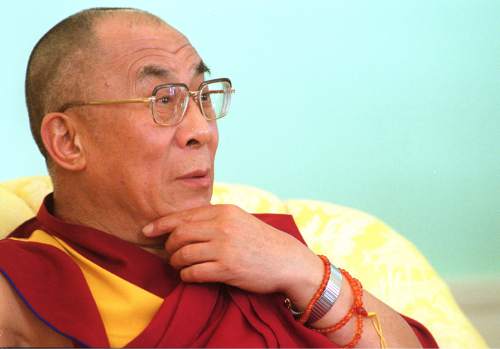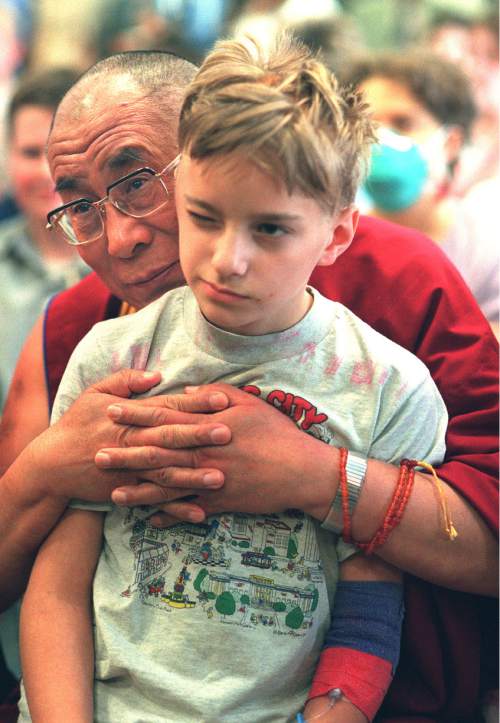This is an archived article that was published on sltrib.com in 2016, and information in the article may be outdated. It is provided only for personal research purposes and may not be reprinted.
Tibet's spiritual leader, the Dalai Lama, has been incarnated 14 times, but he may not be back for a 15th.
"The Dalai Lama institution will cease one day. These man-made institutions will cease," the Dalai Lama told the BBC last year. "There is no guarantee that some stupid Dalai Lama won't come next, who will disgrace himself or herself. That would be very sad. So, much better that a centuries-old tradition should cease at the time of a quite popular Dalai Lama."
The revered Buddhist monk, who turns 81 next month, also has mentioned that if he were reincarnated yet again, he might come back in India or even outside of Asia. Or maybe as a female. Just don't look for him in China.
Such talk has enraged Chinese Communist Party officials, who insist that he must return — and in their country, which now controls the area once known as Tibet.
These leaders have said the Dalai Lama will have "no say over whether he was reincarnated," The New York Times reported. "That was ultimately for the Chinese government to decide."
Tibetan Buddhists believe that some enlightened masters choose to postpone their release from the cycle of existence and be reborn over and over as way to provide continuous wisdom to society. Each Dalai Lama, who serves as spiritual leader and the patron saint of Tibet, is believed to be the "manifestation of compassion."
The first Dalai Lama died in 1474 at 84. A year later, a young boy was seen as the first one's reincarnation, according to the movement's official website, "because of what he had to say about his amazing and flawless recollections of his past life."
The Dalai Lama and the Panchen Lama, or second in command, have a symbiotic relationship, operating in different generations to recognize one another. When the Dalai Lama is a child, he is discovered and reared by the Panchen Lama; when the Panchen Lama dies, his replacement is identified by the Dalai Lama.
The current Dalai Lama was born into a farmer's family, living in northeastern Tibet. At age 2, he was recognized as the reincarnation of the 13th Dalai Lama and has been Tibet's leader ever since.
A few years after China's 1950 takeover of Tibet, the Dalai Lama escaped to India, where he assumed full political and spiritual leadership of Tibetans who remained in China and those in exile.
That dual role lasted until 2011, when he relinquished his political role to a democratically elected leader, retaining only his religious responsibilities.
Meanwhile, the Chinese government has inserted itself into the process of picking his successor.
Back in 1995, Beijing operatives kidnapped the boy the Dalai Lama had named as the Panchen Lama — who has not been seen since — and the government handpicked a replacement.
About 12 years later, Chinese officials created the so-called "Order No. Five, concerning the control and recognition of reincarnations," the Tibetan Buddhist leader wrote on his website.
"This is outrageous and disgraceful. The enforcement of various inappropriate methods for recognizing reincarnations to eradicate our unique Tibetan cultural traditions is doing damage that will be difficult to repair."
That move forced the Dalai Lama to worry about his role in the future. The affable, charismatic leader has said that when he is about 90, he will "consult the high lamas of the Tibetan Buddhist traditions, the Tibetan public, and other concerned people who follow Tibetan Buddhism," the official site stated, "and re-evaluate whether the institution of the Dalai Lama should continue or not."
If those groups decide it is best to find a 15th Dalai Lama, the current seat holder will "leave clear written instructions about this," he wrote, adding that "no recognition or acceptance should be given to a candidate chosen for political ends by anyone, including those in the People's Republic of China."
The global leader's death "will have grave social, religious and economic ramifications in terms of Buddhist order and how it is influenced in Tibetan society and throughout the world," said Lama Thupten Dorje Gyaltsen Rinpoche (also known as Jerry Gardner), leader of Salt Lake City's Urgyen Samten Ling. "I would like to see him reincarnate, but we may not know if he does. It may not become known to the public."
This much is clear, though: The Dalai Lama's death could send the 6 million Tibetans inside China as well as 150,000 Tibetan exiles into chaos and contention.
"Indoctrinated and controlled by the Communist Party," The Times reported last year, "the next leader of the Tibetan community could help Beijing cement its hegemony over Tibet."
It also could further divide an "increasingly politically fractious" exile community, "held together mainly by the Dalai Lama."
His absence would create a vacuum for both groups.
The Dalai Lama's younger brother, Tenzin Choegyal, told The Times, ''We are finished once His Holiness is gone.''





